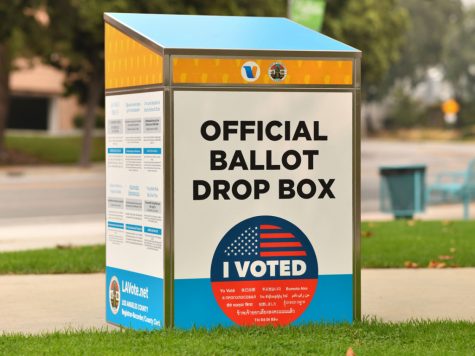America needs standardized voting laws
Inconsistency causes confusion in the election process
November 20, 2020
Every four years, from the summer to early November, social media gets flooded with posts from companies and organizations telling you how important it is to vote, and their message would be a lot more useful if the voting laws from state to state were the same across the entire country.
Millions of Americans watch the news on election night and the days following, and are expected to keep up with all of the different rules for voting and vote counting in every state. A lot of the confusion regarding the 2020 election results are because of the state of Pennsylvania’s odd mail-in ballot counting law. The Supreme Court of Pennsylvania ruled that no mail-in ballot could be counted until 7 a.m. the next day, so millions of Americans watched in confusion as the Pennsylvania vote was being counted for days on end, slowly shifting the lead towards Vice President Joe Biden, until eventually giving him a sizable lead. Pennsylvania had a staggering 2.8 million mail-in ballots received in 2020, all of which had to be counted after election day. Compare that to a state like Florida, which also had a large amount of mail-in ballots (over 2 million), but their results were posted and the state was called by the Associated Press on election night at midnight. Florida is different from Pennsylvania in that it doesn’t have a law restricting their ability to count mail-in votes, so election officials in Florida can count mail-in ballots as soon as they come in.
The President has not helped the confusion by stoking the flames and declaring himself the winner of certain states and the entire election itself, but an easy way to clear the confusion is to make the voting process and vote counting an easy and nationally standardized system. The state-by-state differences don’t stop at just counting votes, it’s also a big mess when it comes to the way in which voters fill in a ballot, register to vote, and send their ballot in. In Harris County, Texas, where the city of Houston is, the election board set up drive-by ballot boxes where people could drop off their ballot, which was approved by the county government. However, just two days before the election, republican representatives in the state urged the Texas Supreme Court to throw out the 127,000 drive-by ballots. That request was later rejected by the court. Similar situations have taken place all over the country, causing upwards of tens of thousands of votes to be invalidated across the nation.
All of this new mail-in ballot voter laws confusion doesn’t even include the complicated in-person and voter registration laws. It seems certain states find any reason to throw out a ballot or stop you from registering to vote. Almost every election cycle there is a new way that boards of election try to throw out votes or registrations. The most recent one has been signature matching in Georgia, where the state or county has a voter’s signature on their ID and compares it to the signature on their ballot or registration form, to find any sort of discrepancy to invalidate the ballot or form. Just the seemingly simple task of obtaining a photo ID isn’t actually as simple as one might think. In certain states (usually the ones that require a photo ID to vote) a photo ID costs money to get, and in any case where you charge money for something, there are going to be people that cannot afford it, making it harder for Americans in poverty to vote.
The biggest problem other than the suppressive nature of these laws is that every state and county can have endless little quirks in their voting laws that make people who move or are new to voting face a great difficulty in voting or registering to vote. If our country wants to hold true to its democratic ideals where everyone can participate in the democratic process, our voting laws and procedures need to change. The easiest way to fix this is to have a c/Congressional bill that not only lays out the specific laws that should remain, but standardizes those laws and regulations across the entire country, making it much easier for Americans to vote not only in national elections, but their own state and local elections as well.





